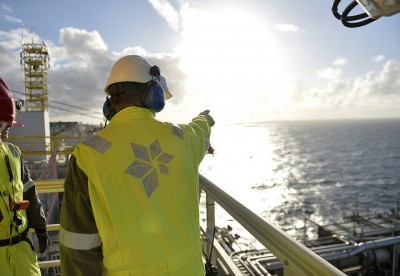After months of doom and gloom in the oil industry, at least one top Norwegian consultant is upbeat and urging others to be so as well. Jarand Rystad, managing partner of Rystad Energy, thinks prices will soar up to over USD 100 a barrel by 2020, just as the state government resorts to withdrawing oil revenues from its huge sovereign wealth fund to help meet the its budget.

Newspaper Dagens Næringsliv (DN) reported Friday that Finance Minister Siv Jensen, who long has advocated more use of oil revenues, has now taken an historic step. She became the first Norwegian finance minister ever to take money out of Norway’s so-called “Oil Fund.”
The first withdrawal came in January, DN reported, and it amounted to NOK 6.7 billion (USD 779 million). The finance ministry confirmed the transaction in an email to DN this week.
With oil prices currently just a third of what they were early last year, much less money is flowing into the state treasury and the oil fund itself, where the country’s oil revenues are mostly set aside and invested for future generations. Since the fund was created in 1996, with a stated purpose of funding Norwegians’ pensions, nearly 3,500 billion kroner has been deposited, and the fund itself has swelled through investment returns to become the largest sovereign wealth fund in the world.
The recent economic downturn means the time has come to dip into the fund, to avoid any budget deficit. The move doesn’t come as any surprise, because it was predicted during last fall’s state budget negotiations. And even though Jensen and the country’s conservative coalition government were criticized for using more actual oil money in the budget than ever before, Jensen has been quick to point out that the amount itself is well under the limit that’s been imposed for years: 4 percent of the value of the fund itself.

If oil consultant Rystad of Rystad Energy is correct, Jensen’s withdrawals may be short-lived. Speaking at a conference organized by law firm Kluge in Norway’s hard-hit oil capital of Stavanger, DN reported that he stressed brighter days ahead and that oil prices will rise to around USD 105 a barrel within the next four years.
He clearly rallied the oil troops at the conference, which DN described as more like a revival meeting. “When someone comes up to you and asks with a meaningful gaze how it’s going in the oil industry, you can answer, ‘it’s going great!’ Rystad told his audience. “We have never had higher demand, the product has never been more competitive and we had enormous growth last year.” His audience found that amusing, but Rystad was serious. He’s convinced prices will rise again.
The outlook, he contends, is better than most people think. Since investment levels are currently low (“too low,” in his opinion), demand will soon outstrip supply. Costs in the industry have also been cut dramatically and production in older fields is likely to decline.
He’s warning the industry against making too many cuts, both in investment and staffing. When the market turns around, he fears, many companies will lack experienced personnel to take advantage of it.
“This downturn is more brutal than the one in 1998-2000,” Rystad told DN. “This time (the cuts) are much worse, and that’s worrisome.”
newsinenglish.no/Nina Berglund

